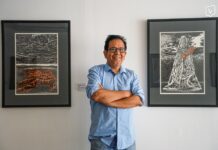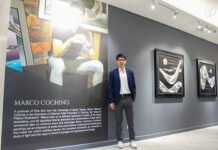LIKE a street-smart Filipino, Godfrey Anijah-Obi, a Nigerian sophomore taking up Medical Technology, makes sure he leaves before 6:45 a.m. to avoid the turtle-paced Dapitan traffic, lest he comes late for his Clinical Chemistry at 7 a.m.
Another foreign student, Korean Vitna Kim, a sophomore from the Alfredo M. Velayo-College of Accountancy, never fails to surprise people whenever she rides a jeepney, reaching out her fare and saying “bayad po” in Korean twang.
They are only among the 332 foreign students in the University who stand out with their unique racial features. Studying in a country miles away from home, they have found a new home on campus.
Homesick
The University’s reputation for offering quality education, which Anijah-Obi ang Kim learned through recommendations and word-of-mouth, is the reason why they chose to study here.
Ronald James Balao, who took his pre-med studies in Biology and Chemistry at the University of California at Riverside, chose to study at UST for the same reason. The renowned yet moderately-priced Medical education the University offers and the recommendations he got from California-based Thomasian doctors prompted him to enroll at UST.
But studying in a foreign land comes with sacrifice.
“Not a day that I don’t feel homesick,” Balao, a Medicine junior who lives alone in a nearby apartment, told the Varsitarian. “It’s a good thing Medicine keeps me busy to take my mind off the sadness.”
Even with letters and frequent phone calls, he, like many other foreign students, eagerly looks forward to the two-month summer break so he could fly back home.
Language barrier is also one of the problems foreign students have to face.
Despite having taken special Filipino classes in the University during their first year, they still find it difficult to speak in Filipino.
“I don’t know how to speak Filipino, but I understand a little,” Anijah-Obi told the Varsitarian. Fortunately, his professor taught the Rizal course in English.
Bianca Katrina Reyes, an Accounting sophomore who grew up in Abu Dhabi, United Arab Emirates, opted to fly back to the Philippines, her birthplace, to study at UST. Despite being born to Filipino parents, she grew up in a non-Filipino-speaking household, giving her inadequate Filipino-speaking skills.
Kim has the same predicament. Last year, she dropped her Philippine History subject, which was taught in Filipino. Now, she is taking the unit at the College of Science. Even with a five-year stay in the country and basic know-how of Filipino, Kim still finds it difficult to speak Filipino because of the complexities in speaking it.
Ditto with Balao. He and his fellow juniors are each given a patient for their clerkship rounds in the hospital. Because of his limited Filipino-speaking skills, he finds it difficult to communicate with Filipino patients and he has to tread back and forth to his patients and fellow Medical students for the proper translation of the patient’s condition.
“I can speak a little Filipino, and thankfully, in Medicine, there are no subjects in Filipino,” Balao said. Though he understands some Filipino words, he finds most terms hard to say and comprehend.
To aide foreign students’ needs, the UST-International Students Association (UST-ISA) was established in 1990 under the Office of Student Affairs. The acronym ISA, Filipino for “one,” connotes its goal of promoting unity despite the diversity of races.
“We created UST-ISA to let international students interact with others,” said Rowena Castro, UST-ISA adviser.
Wanting to integrate the foreign students to the Thomasian community, the association has organized several projects like team-building programs, special Filipino classes and tutorials.
Last Sept. 9, UST-ISA hosted its first acquaintance party in a house along Dapitan, where officers and members were introduced to one another, through socials and friendly games.
With about 332 registered members, Balao heads the organization as president. Anijah-Obi is auditor and Kim is personal relations officer for AMV-College of Accountancy.
Being in the country for more than a year, Anijah-Obi, Balao, Kim and Reyes said they find it difficult to bear the country’s hot climate. Yet amid the hardships and sacrifices they experience, they know it’s worth the while as long as they could take the sun-embellished UST diploma back home. Raychel Ria C. Agramon













